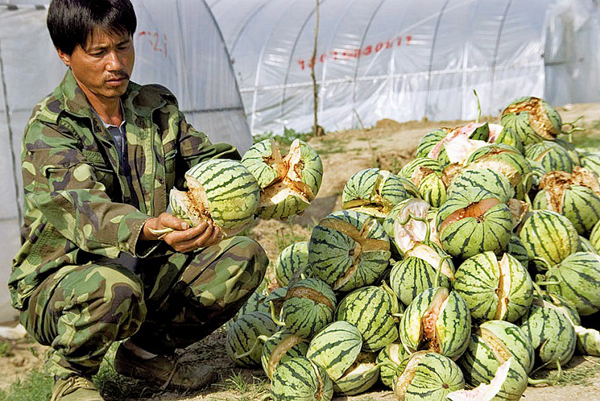Bursting melons add to food woes
Watermelons have been bursting by the score in eastern China after farmers gave them overdoses of growth chemicals during wet weather, creating what state television called fields of "land mines."
|
Watermelons have been bursting by the score in eastern China after farmers gave them overdoses of growth chemicals during wet weather. |
About 20 farmers around Danyang City in Jiangsu Province were affected, losing up to 45 hectares of melon, China Central Television said.
Prices over the past year spurred many farmers to jump into the watermelon market. Those with the exploding melons apparently were first-time users of the growth accelerator forchlorfenuron, though it has been widely available for some time, CCTV said.
|
Don't miss: |
Wang Liangju, a professor with the College of Horticulture at Nanjing Agricultural University, said forchlorfenuron is safe and effective when used properly. He said the drug had been used too late into the season, and that recent heavy rain also raised the risk of the fruit cracking open. But the variety of melon also played a role.
"If it had been used on very young fruit, it wouldn't be a problem," Wang said. "Another reason is that the melon they were planting is a thin-rind variety and this kind are actually nicknamed the 'exploding melon' because they tend to split."
Farmer Liu Mingsuo ended up with 3 hectares of ruined fruit and told CCTV that seeing his crop splitting open was like a knife cutting his heart.
"On May 7, I came out and counted 80 (burst watermelons) but by the afternoon it was 100," Liu said. "Two days later I didn't bother to count."
In March last year, Chinese authorities found that "yard-long" beans from the southern city of Sanya had been treated with the banned pesticide isocarbophos. The tainted beans turned up in several provinces, and the central city of Wuhan announced it destroyed 3.5 tons of the vegetable.
The government has also voiced alarm over the widespread overuse of food additives, like dyes and sweeteners that retailers hope will make food more attractive and boost sales, prompting calls for clarification on farm chemical standards.
 0
0 







